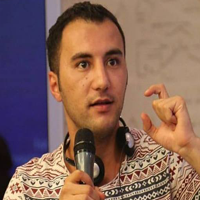ذات مرّة، قرأتُ خبراً على صحيفةٍ رسمية سورية، مفاده أن ورشات البلدية باشرت عملية تعبيد الشوارع في المنطقة التي أعيش فيها، ونقل الخبر عن مسؤول في البلدية قوله: "إن عمليات التزفيت سوف تنتهي خلال ثلاثة أيام"، نزلت لأزقّة المنطقة القديمة التي كنتُ أعيش فيها بمدينة حلب، فلم أجد أي ورشات وأي عمليات تعبيد.
في تلك اللحظة تفجّرت لديَّ رغبة كبيرة في مواجهة الصحفي الذي نشر الخبر والمسؤول الذي صرّح على العلن لما نشروه من معلومات مغلوطة، فأرسلت بريداً ورقياً إلى زاوية "آراء القرّاء" في الصحيفة، ولم أتلقَّ أي رد.
مضى على هذه الحادثة نحو عشر سنوات، لم يكن هناك مواقع للتواصل الاجتماعي أو منصّة تمكّنني من كشف الحقيقة، وبالأحرى لم أكن صحفياً حينها.
اختلف الأمر كثيراً اليوم، فلم يعد بإمكان وسيلة الإعلام التي تنشر خبراً مغلوطاً أو غير دقيق أن تنجو بهذه البساطة، فالفضاء الإلكتروني اليوم أتاح إنشاء عشرات المنصّات والمراصد العربية، دورها بشكلٍ رئيسي إجراء رقابة على المحتوى المنشور على وسائل الإعلام وتقويمه، وهو ما يجعل وسائل الإعلام تراقب نفسها وتتأكّد من دقّة كل معلومة قبل نشرها، لأنّها باتت تعلم بوجود "حارس البوابة" الذي يراقب كل ما تنشره من معلومات.
تسرد "مجلة الصحافة" في هذا التقرير، أبرز المراصد والمنصّات العربية التي تأسّست بهدف تصحيح المعلومات والصور ومقاطع الفيديو المغلوطة، والمنشورة على وسائل الإعلام المختلفة.
لأن للخبر أمانة
في سوريا، أسّس الصحفي أحمد بريمو في العام 2016، منصّة إلكترونية مهمّتها تقويم الأخبار التي تخص السوريين داخل وخارج البلاد، وهي منصة "تأكد"، وانضم إليه لاحقاً عدد من الصحفيين بشكلٍ تطوّعي.
يتّخذ موقع "تأكّد" شعار "لأن للخبر أمانة" وقوّم منذ تأسيسه أكثر من 800 خبر مغلوط، من بينها 125 خبرا من إعلام النظام السوري، و129 خبرا من إعلام المعارضة السورية، و107 خبرا من الإعلام العربي، و94 خبرا من الإعلام الأجنبي، 252 خبرا من مواقع التواصل الاجتماعي، و103 خبرا من إعلام "الإدارة الذاتية" في سوريا.
يقول مدير تحرير المنصّة ضرار خطّاب: "إن الهدف من تأسيس المنصة هو حث الناشرين الصحفيين أو المواطنين الصحفيين أو المدونين على وضع المصداقية في مقدمة أولوياتهم، واحترام المتلقي وعدم استخدامه فقط كأداة للترويج واستهلاك الأخبار حتى لو كانت كاذبة او مضللة" موضحاً أن "وجود رقيب متخصص بالتحقق من تلك المعلومات ونشر التوضيحات والتصحيحات بات حاجةً ملحّة".
ويوضّح خطّاب لـ "مجلة الصحافة" أن تأسيس منصّات لرصد الأخبار المغلوطة هو أمر مفيد، غير أنَّ تحلّي الناشرين والصحفيين بروح المسؤولية وعدم تضليل القارئ هو الأفضل، كون المصداقية هي ركيزة أساسية ينطلق منها العمل الصحفي، والمعلومة غير الصادقة لا تنتمي للعمل الصحفي.
يلمس القائمون على "تأكّد" ثقة من المتابعين، حيث باتت هذه المنصّة ملاذ السوريين الذين يشاهدون أخباراً يشكّكون فيها، وبحسب خطّاب فإن "تأكّد" بمجالها الجديد على مجتمعنا السوري في التحقق من المعلومات، ساهمت في حث الصحفيين والمدونين على التحقق من المعلومات قبل نشرها، والتفكير ملياً بالمتلقي قبل اتخاذ قرار النشر.
ويتابع خطاب، أن أهمية منصّة "تأكّد" تكمن في كونها تركّز على إعلام جميع أطراف النزاع السورية، بهدف نشر المعلومة الصحيحة ومكافحة الأخبار الكاذبة مهما كان مصدرها، بحيث يتمكن المتلقي من تقييم الوضع بموضوعية وتكوين وجهة نظر مبنية على معلومات صحيحة دون أن يقع تحت تأثير التضليل والدعاية، خاصة في ظل الاستقطابات والدينية والقومية التي تعيشها سوريا.
بدوره يشرح مؤسّس "تأكد" أحمد بريمو الآليات التي تستخدمها المنصّة للتحقّق قائلاً: "إذا كان الخبر عبارة عن صورة أو فيديو، فإننا نلجأ لتقنية البحث العكسي التي توفرها محركات بحث عديدة مثل غوغل، أما إذا كان الخبر عبارة عن معلومات، فنستعين بالمراسلين المنتشرين في سوريا والمصادر المتعاونة، حيث يُجرى مقاطعة للمعلومات للتحقق من مصدرين منفصلين"، لافتاً إلى أن هذه الأمور يجب على أي صحفي اتباعها قبل نشر أي خبر.
فضلاً عن ذلك تستخدم "تأكّد" تقنيات أخرى للتدقيق، فإذا كان الخبر عبارة عن فيديو يقول إن طائرة سقطت في حلب مثلا، فإننا نحلّل حالة الطقس وطبيعة الأرض والغيوم وأمور عديدة تساعد على تمييز صحة التسجيل وما يشاع حوله.
يعتبر بريمو أن الشائعات ليس حكراً على العالم العربي فالجميع يبث الشائعات، وهذا الأمر منتشر منذ الأزل، وقال: "ربما أصبحت الشائعة منتشرة في العالم العربي مؤخرا أكثر من ذي قبل نتيجة انطلاق الربيع العربي ومساحة الحريات التي حصلت عليها الشعوب في هذه المنطقة، فأصبح يمكننا أن نقرأ ونشاهد روايات عديدة حول قضايا معينة" مبيّناً أنه في مناطق النزاع مثل سوريا فإن الدعاية الإعلامية تستخدم كسلاح من قبل جميع الأطراف المتصارعة، وهي أيضا تعتبر من أنواع الشائعات أو الأخبار الكاذبة.
أكيد
من سوريا إلى الأردن، توجد تجربة مشابهة، تتمثّل في "مرصد مصداقية الإعلام الأردني" المعروف باسم "أكيد". تأسّس هذا المرصد في العام 2014، من قبل معهد الإعلام الاردني وهو مؤسسة أكاديمية وبحثية تقدم درجة الماجستير في الإعلام الحديث، وبدعم من صندوق الملك عبدالله للتنمية ، والهدف منه متابعة المحتوى الإعلامي في مختلف وسائل الإعلام المحلية إلى جانب كل ما ينشر عن الأردن في وسائل الإعلام العربية والعالمية، وفق أسس ومعايير مهنية وأخلاقية على ما يشرح مدير تحرير مرصد "أكيد" أسامة الرواجفة.
وقال الرواجفة لـ "مجلة الصحافة": "إن هدف إنشاء المرصد هو محاولة إيجاد مرجعية وطنية مستقلة لتطوير معايير المصداقية وجودة المعلومات الصحفية، وإدخال ممارسة مهنية جديدة في رصد ومساءلة وسائل الإعلام تقوم على أسس علمية، إضافة إلى المساهمة في حماية حق المجتمع في المعرفة، والمساهمة في مساعدة وسائل الإعلام على تحسين جودة المحتوى والأداء الإعلامي، ونشر ثقافة المساءلة الإعلامية وسط وسائل الإعلام والصحفيين والمجتمع، ورفع سوية أداء وسائل الإعلام الأردنية من خلال تطوير قدرات الصحفيين في الوصول إلى المعلومات من مصادرها، والكشف عن الأخبار الكاذبة أو المضللة أو التي تشوه الحقائق أو تعتمد على أنصاف الحقائق، أو تلك التي يشوبها اختلالات مهنية في الوصول إلى المصادر أو التعامل معها، يسرد الرواجفة.
وأضاف: "انطلق المرصد من فكرة أن التطور التقني والتكنولوجي وانتشار منصات التواصل الاجتماعي ساهما في توسع مفهوم وسائل الإعلام من الإعلام التقليدي إلى مساحة أوسع، جعلت كل شخص يمتلك وسيلة إعلام خاصة به، ما سبّبَ تشوّهًا في المعايير المهنية والأخلاقية التي يجب أن يحاكم وفقها المحتوى الإعلامي قبل نشره.
لا يقوم "أكيد" على أي أسس تجارية ولا يقبل الإعلان التجاري، وهو يعمل انطلاقاً من إيمان "معهد الإعلام الأردني" و"صندوق الملك عبد الله للتنمية" بحاجة المجتمع إلى مثل هذا المشروع الذي يكافح الشائعة ويعزز من الرقابة المهنية والأخلاقية على أداء وسائل الإعلام ويعمم ثقافة التأكد قبل النشر.
ويوضّح الرواجفة أن "أكيد" بات مصدراً هاماً للعاملين في المجال الإعلامي والجمهور الأردني لمعرفة الحقيقة، لافتاً إلى أنّه منذ تأسيس المرصد، فقد نُشر كم هائل من التقارير التي تكافح الشائعات وتنفي الأخبار غير الدقيقة. وفي هذا الإطار، رُصِدَ 102 تقرير حول أخبار وصور مزيّفة بالكامل لا صحّة لها نهائياً، كما أصدر 548 تقريراً يومياً لمراقبة دقّة وموضوعية المحتوى الإعلامي و188 تقريراً متخصّصاً في إلقاء الضوء على الظواهر الإعلامية الجديدة والمخالفات المهنيّة المتكرّرة.
لا يركّز "أكيد" على تقويم المعلومات غير الدقيقة، بل يركّز على تشجيع وسائل الإعلام التي تقوم بممارسات إيجابية وتقلّل نسبة الخطأ.
مراصد في مصر
على غرار سوريا والأردن، ثمّة مراصد ومنصّات إلكترونية لمحاربة الشائعات، تحقّق رواجاً كبيراً بين المصريين، فهي تدخل في حياتهم اليومية وتقف لمحاولة دحض أي شائعة، سواء تلك التي تصدر من وسائل الإعلام، أو تلك التي يتناقلها الناشطون على مواقع التواصل الاجتماعي.
ومن أبرز هذه المواقع التي لاحظتها "مجلة الصحافة"، هو موقع "ده بجد؟" باللهجة المصرية، والذي يعني باللغة العربية الفصحى "هل هذا صحيح؟".
تُصمّم هذه المنصّة صورتين، الأولى تروي الشائعة والثانية تروي تصحيحها، كما ترفق مصادر ومراجع لمعلوماتها في التعليقات على المنشورات.
وفضلاً عن متابعة وسائل الإعلام، تتابع المنصة ما ينشره الناس العاديون، من معلوماتٍ وصور، وتقوم بتقويمها وتصحيحها، وتحظى هذه المنصّة بمتابعة كبيرة.
ومن بين المنصّات المصرية الخاصة بمكافحة الشائعات، منصّة "متصدقش" باللهجة المصرية والتي تعني "لا تصدّق"، وتعمل بنفس نمط المنصّة السابقة، مع تركيزها بشكلٍ كبير على ما تنشره وسائل الإعلام المصرية.
كما أن هذه المنصّة تقوم بجهدٍ إضافي، وهي تنشر مقالات وتقارير تعليمية، تعرّف الجمهور بأدوات التحقّق الرقمية، وآخر ما توصّلت إليه التكنولوجيا من أدوات وطرق مبتكرة للتدقيق الرقمي والمعلوماتي للأخبار والصور والفيديو.
كما يوجد منصّات أخرى من دول عربية مختلفة تحاكي الغرض ذاته، وأبرزها منصّة "فتبيّنوا لمكافحة الشائعات"، و"هيئة مكافحة الشائعات" التي لها صفحات على جميع موقع التواصل الاجتماعي.
كما أنّ هناك منصّات أخرى، مهمّتها إجراء "التدقيق اللغوي لما يُنشر في وسائل الإعلام، وتسليط الضوء على المقالات المنشورة والتي تحتوي على أخطاء لغوية مثل منصّة "اكتب صح" ومنصّة "نحو وصرف".
هل يكفي إنشاء هذه المنصّات؟
يعتبر مدير "مرصد مصداقية الإعلام الأردني" (أكيد)، أسامة الرواجفة، أن السبب الرئيسي للشائعات في العالم العربي هو عدم وجود قوانين تضمن الوصول على المعلومات الصحيحة، وعدم شفافية الحكومات مع الإعلام، فضلاً عن ضعف التعليم والثقافة في المجتمعات العربية والجهل أحيانا في مجتمعات عربية أخرى، والنزاعات السياسية بين أطراف المجتمع الواحد من جهة وبين الدول من جهةٍ أخرى.. إلخ.
ويرى الرواجفة أنّ ما تقوم به هذه المنصات غير كافٍ، لأنّها تقيّم الأخبار وتنشر ثقافة المساءلة والتحقّق، مشدّداً على ضرورة أن يكون هناك تشريعات إعلامية، كتشريع حق الحصول على المعلومة الصحيحة، موضحاً أن التشريعات لن تأتي إلّا عندما تؤمن الحكومات العربية بحق الناس في المعرفة، وأن هذا الحق كفيل بالحد من الشائعات.
كما شدّد الرواجفة على ضرورة إدخال منهج "التربية الإعلامية والرقمية" لتوعية الأجيال بحقوقها وواجباتها على الفضاء الإلكتروني.
وصنّف الرواجفة، مردّدي الشائعات على مواقع التواصل الاجتماعي إلى ثلاث أقسام، الأول هم أناس تابعين لجهات سياسية، اقتصادية ومنظمات غير قانونية سواء داخلية أو خارجية، يقومون ببث شائعات مدروسة ولها أهداف محددة، وهو ما يطلق عليه مجازاً "الذباب الالكتروني".
أما الفئة الثانية من مردّدي الشائعات، فهي بحسب الرواجفة "أشخاصٌ مثقفون وواعون لكنهم يتداولون الشائعات التي تنسجم مع أفكارهم وتوجهاتهم السياسية والعقائدية والفكرية، رغم معرفتهم تماما بأنها غير صحيحة، وعلى الأخص في القضايا الداخلية لكل دولة، في حين تتكوّن الفئة الثالثة من البسطاء غير المتعلّمين، وهم الفئة المستهدفة من ق








































